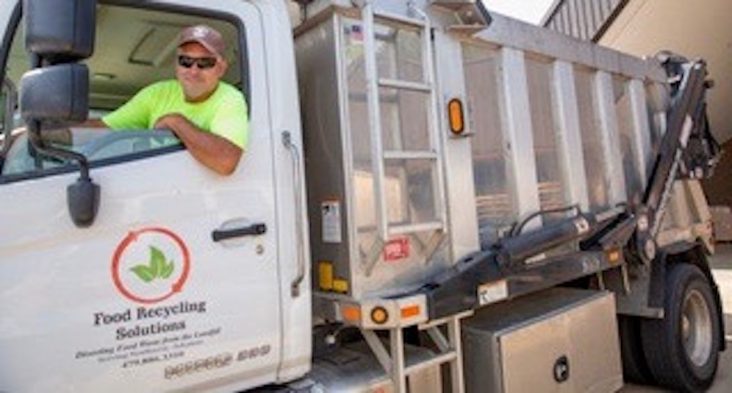Tyson Foods partners with Food Loops of Rogers to compost cafeteria food waste
by July 26, 2021 2:31 pm 1,889 views

Tyson Foods said a partnership with Rogers-based Food Loops has helped it to divert 35 tons of food wastes from its corporate cafeteria in Springdale since 2018. Photos by Beth Hall
Tyson Foods has tested a food composting program with local sustainability startup Food Loops in the meat giant’s corporate cafeteria. Food scraps have been collected by Food Loops and turned into compost for farmers and consumers seeking natural fertilizer solutions.
Since the pilot began in 2018, Tyson said more than 35 tons of food waste has been diverted as a result of the program. The company said waste reduction enables Tyson to streamline costs and send as few materials as possible to landfills.
“Studies have shown that about 30% to 40% of food that is produced in America is wasted. At Tyson Foods, our work towards a zero-waste future starts at home at our world headquarters in Northwest Arkansas,” said Alex Floyd, senior manager of sustainability at Tyson Foods. “This composting pilot will allow us to test and learn how we can be less wasteful and more mindful of what we consider trash. The learnings will help us expand this program to other locations in the future.”
Tyson said it was the first large corporation to sign on with Food Loops. In 2018, the companies began to look for a solution to the cafeteria’s specific food waste challenges. After an audit, the partners worked to create a “nothing wasted” solution and composting program.
Diners in the cafeteria place their food trays on a conveyor belt when they are finished eating and from there, cafeteria staff sort and divert uneaten food items and compostable products into designated food-waste bins. Food Loops regularly collects the bins and takes them to its local facility where contents undergo an approximately 90-day decomposition process before being sold to area farmers, landscapers, gardeners and other customers as a natural, nutrient-rich soil enhancer.

Tyson said the pilot with Food Loops is just one of the ways it’s working to reduce food waste in the corporate cafeteria. Jeff Callahan, the corporate chef at Tyson, said the company also replaced single-used food and beverage containers such as cups, plates, lids and straws with compostable alternatives.
Tyson recently updated overall sustainability goals. The company plans to have net-zero greenhouse gas (GHG) emissions by 2050. This ambitious goal replaced the company’s previous target of reaching a 30% reduction in net-zero GHG emissions by 2030. Tyson said its updated goals involve all of its global operations and its supply chain.
